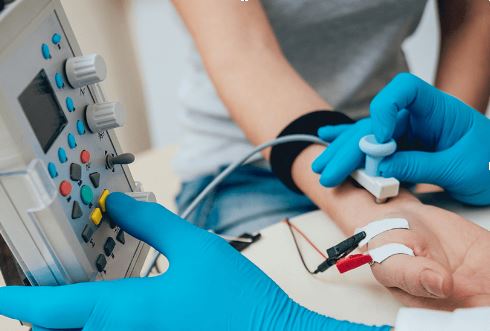
by Jessalyn Lau
What’s the first thing that comes to mind when you hear ‘nerve conduction study’ or ‘nerve testing’? Do images of Frankenstein or scenes of the ‘chokey’ from Matilda come to mind? If so stop right there, take a deep breath, and rest assure that those images are far from the truth! Though it’s not a spa experience, Electromyography (EMG) and Nerve Conduction Studies (NCS) really aren’t that bad!
What Is EMG And NCS?
The human body uses electrical activity to create movement, feel sensations, pain, hearing, vision, balance, etc. EMG/NCS are procedures which utilize electrical currents and thin needles to evaluate nerve and muscle function in the human body; typically, in the arms, legs, neck, and lower back. These examinations are usually requested when patients have complaints of cramps, pain, numbness, tingling, and/or weakness. Think of it as an electrician looking at the wiring in your house. The wiring can be complicated, often can’t be seen, and therefore it can be difficult to identify the problem. The nervous system in your body is very similar.
The results of your EMG and NCS can help your doctor pinpoint a specific diagnosis for you. Some common diagnoses we see are peripheral nerve injuries such as carpal tunnel syndrome, cubital tunnel syndrome, pinched nerves in the neck/back, neuropathies from diseases such as diabetes, and many other types of injuries or illnesses related to the neuromuscular system. It’s most effectively used in conjunction with a review of your medical history, a physical exam, and imaging studies. EMG and NCS procedures are another useful tool your physician uses to better understand and treat your medical condition.
The results of your EMG and NCS can help your doctor pinpoint a specific diagnosis for you. Some common diagnoses we see are peripheral nerve injuries such as carpal tunnel syndrome, cubital tunnel syndrome, pinched nerves in the neck/back, neuropathies from diseases such as diabetes, and many other types of injuries or illnesses related to the neuromuscular system. It’s most effectively used in conjunction with a review of your medical history, a physical exam, and imaging studies. EMG and NCS procedures are another useful tool your physician uses to better understand and treat your medical condition.

Does it hurt?
Most patients do very well during the procedure. The nerve conduction study is typically described as “feeling weird,” since the electrical current will cause the muscles to move/jump/dance and the nerves begin to tingle. The needle examination is often described as a small pinch and at times a slight cramping sensation. Again, most patients tolerate the procedure quite well and tell us that it was even better than they expected. If you do need a break from the procedure, just ask and we will be happy to give you as much time as you need.
When we asked Dr. Jason Chang what his thoughts were about the tolerability level of this procedure he replied, “I would describe the procedure as mildly annoying but tolerable. Would I prefer to be hanging out on the beach or exercising…of course! But for patients looking for answers for their medical concerns, I think this procedure is well worth it. And yes, I have experienced the procedure myself and thought it wasn’t bad at all!”
When we asked Dr. Jason Chang what his thoughts were about the tolerability level of this procedure he replied, “I would describe the procedure as mildly annoying but tolerable. Would I prefer to be hanging out on the beach or exercising…of course! But for patients looking for answers for their medical concerns, I think this procedure is well worth it. And yes, I have experienced the procedure myself and thought it wasn’t bad at all!”
How To Prepare For The Testing?
To prepare for your EMG/NCS procedure, we would advise that you arrive early to complete any needed forms prior to your appointment. The testing itself can take anywhere from 20-45 minutes depending on the condition and area being evaluated. We recommend that you wear a short sleeved shirt, shorts, and slippers as each limb will need to be fully examined. Please come in with clean skin and do not put any lotion or cream on as the electrodes we use during the exam won’t stick well to the skin and will make the study more difficult. If you have any open skin lesions or infections, it would be best to postpone the testing until these have healed. Also, if you have a cardiac pacemaker or defibrillator, please tell our staff prior to your testing so we may contact your cardiologist and take the appropriate measures.
Our team of neurologists and physiatrists here at Hawaii Pacific Neuroscience work together in a close, collaborative environment which is undoubtedly beneficial to the patient in resolving the causes of their pain and functional impairments. Without question, HPN is a unique professional environment that does not exist anywhere else in Hawaii! We continue to keep our doors open, accept new patients, and accept all health insurances in Hawaii to continue to provide exceptional and accessible care for you and your family. Mahalo for the opportunity to be part of your health journey!
For more information, check out our website at hawaiineuroscience.com or call/text us today at
808-261-4476 to schedule your appointment today!
For more information, check out our website at hawaiineuroscience.com or call/text us today at
808-261-4476 to schedule your appointment today!

